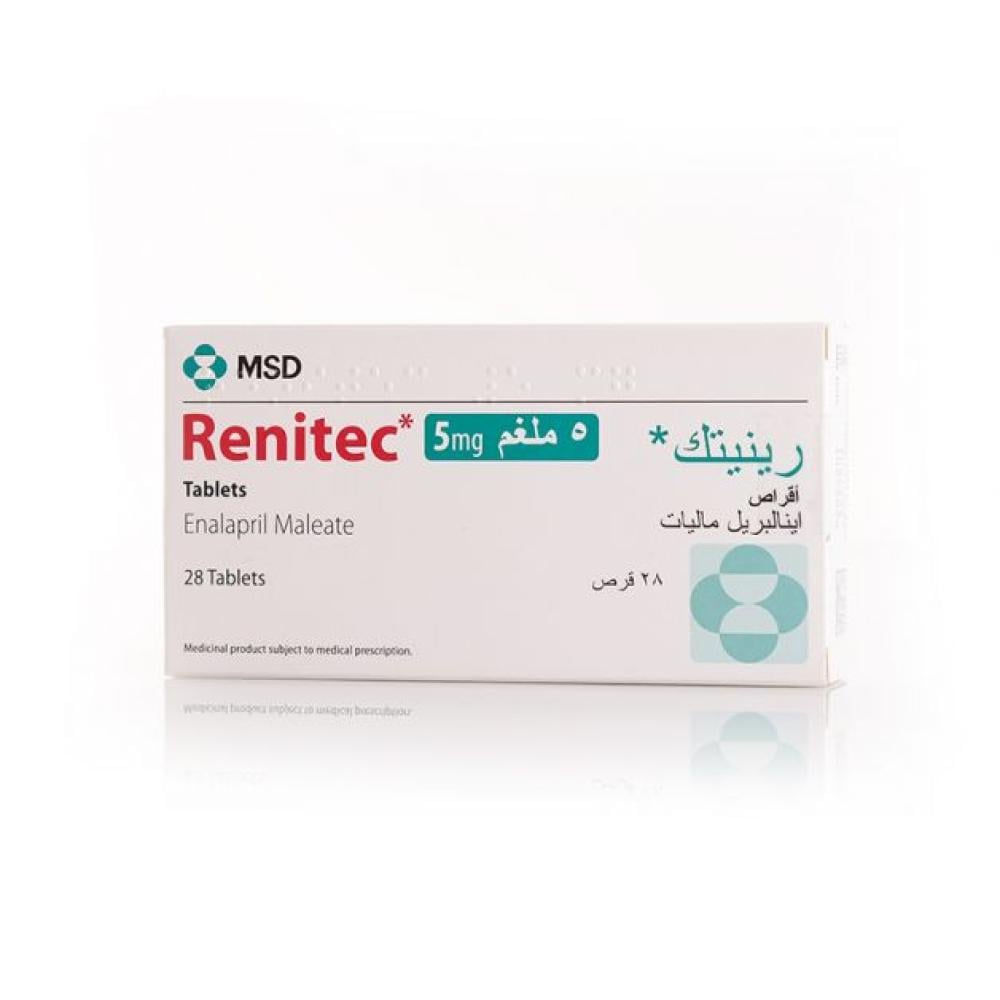

Enalapril 5 mg tablets
What is enalapril and what is it used for?
Enalapril belongs to a class of medications called angiotensin-converting enzyme (ACE) inhibitors. It works by relaxing blood vessels, lowering blood pressure, and increasing the heart's supply of blood and oxygen.
Enalapril is used for:
• Treatment of high blood pressure (hypertension)
• Treating heart failure (poor heart function). It can reduce the need to go to the hospital and may help some patients live longer.
• Prevent signs of heart failure. Signs include shortness of breath, fatigue after mild physical activity such as walking, or swelling of the ankles and feet.
This medication works by dilating blood vessels. This lowers blood pressure. The medication usually starts working within an hour, and the effect lasts for at least 24 hours. Some people will need several weeks of treatment to see the best effect on their blood pressure.
What you need to know before using enalapril
Do not use enalapril
• If you are allergic (hypersensitive) to enalapril maleate, any of the other ingredients in these tablets, or ACE inhibitors
• If you have ever had swelling of your face, lips, mouth, tongue or throat that caused difficulty swallowing or breathing (angioedema) when the cause was unknown or was hereditary.
• If you are more than 3 months pregnant. (It is also best to avoid enalapril maleate tablets in early pregnancy.)
• If you have diabetes or impaired kidney function and are being treated with blood pressure lowering medications containing aliskiren.
• If you have ever had an allergic reaction to a type of medicine similar to this one called angiotensin-converting enzyme (ACE) inhibitors.
• If you have taken or are currently taking sacubitril/valsartan, a medicine used to treat a type of long-term (chronic) heart failure in adults, your risk of developing angioedema (rapid swelling under the skin in an area such as the throat) may be increased.
Warnings and precautions
You should tell your doctor if:
• If you have a heart problem
• If you have a condition involving blood vessels in the brain
• If you have a blood problem such as low or missing white blood cells, low platelet count, or low red blood cell count (anemia)
• If you have a kidney problem (including a kidney transplant). This may lead to high levels of potassium in your blood, which can be dangerous. Your doctor may need to adjust your dose of enalapril or monitor your blood potassium level.
• If you are very sick (vomiting severely) or have had severe diarrhea recently
• If you have diabetes.
• If you have a liver problem or have developed jaundice (yellowing of the skin and whites of the eyes)
• If you are undergoing dialysis
• If you are over 70 years old
• If you have low blood pressure (you may notice this as weakness or dizziness, especially when standing)
• If you have a collagen vascular disease (such as lupus erythematosus, rheumatoid arthritis, or scleroderma), or if you are taking a treatment that suppresses the immune system, or taking the medications allopurinol or procainamide, or any combination of these
• If you think you are (or may become) pregnant.
Other medications and enalapril
It is especially important to tell your doctor if you are taking any of the following:
• Angiotensin II receptor blockers (ARB) or aliskiren
• Other medications that lower blood pressure, such as beta blockers, vasodilators, or water pills (diuretics)
• Potassium supplements (including salt substitutes), potassium-sparing diuretics, and other medications that can increase the amount of potassium in the blood (eg, trimethoprim and cotrimoxazole for infections caused by bacteria; cyclosporine, an immunosuppressant drug used to prevent organ transplant rejection; and heparin, a blood-thinning drug used to prevent clots)
• Lithium, used to treat a certain type of depression.
• Tricyclic antidepressants such as amitriptyline, used to treat depression.
• Medications for mental problems called 'antipsychotics'
• Some cough and cold medicines and weight loss medications that contain substances called 'sympathomimetic agents'
• Some pain or arthritis medications, including gold therapy.
• Antidiabetic medications including oral medications to lower blood sugar and insulin
• Nonsteroidal anti-inflammatory drugs (NSAIDs), including COX-2 inhibitors (drugs that reduce inflammation, and can be used to help relieve pain)
• Aspirin (acetylsalicylic acid)
• Medications used to dissolve blood clots (thrombolytics)
• Drugs most often used to prevent rejection of transplanted organs (sirolimus, everolimus and other drugs belonging to the class of mTOR inhibitors).
• Medicines containing neprilysin inhibitors, such as sacubitril (available as a fixed-dose combination with valsartan), used in patients with heart failure, and racecadotril. The risk of angioedema (swelling of the face, lips, tongue, or throat with difficulty swallowing or breathing) may be increased.
How to use enalapril
Always take your medication exactly as your doctor has told you. If you are unsure how to take your tablets, ask your doctor or pharmacist.
• Do not take more tablets than prescribed.
• You should take your tablet at the same time every day unless your doctor tells you otherwise.
• If you are taking your medicine twice a day (two tablets daily), take one tablet in the morning and one in the evening, unless your doctor tells you otherwise.
The recommended dose is to be swallowed with a glass of water:
Adults
High blood pressure:
• The recommended starting dose is 5 mg to 20 mg taken once a day.
• Some patients may require a lower starting dose.
• Long-term dose: 20 mg taken once daily.
• The maximum long-term dose is 40 mg once a day.
heart failure:
• Starting dose is 2.5 mg taken once a day.
• Your doctor will increase this amount step by step until the appropriate dose for you is reached.
• Long-term dose: 20 mg taken in one or two doses.
• The maximum long-term dose is 40 mg daily divided into two doses.
Seniors (65 years and older)
Your doctor will determine your dose and it will depend on how well your kidneys are working.
Patients with kidney problems
Your dose of medication will be changed depending on how well your kidneys are working.
Use in children and adolescents
Experience with the use of this medication in children with high blood pressure is limited. If your child can swallow tablets, the dosage is calculated using the child's weight and blood pressure.
The recommended starting doses are:
• Between 20 kg and 50 kg - 2.5 mg every day
• Over 50 kg - 5 mg every day.
Possible side effects
Stop using the product and seek immediate medical attention if:
• Swelling of the face, lips, tongue, or throat, which may cause difficulty breathing or swallowing.
• Swelling in the hands, feet, or ankles
• Sudden rash, burning, redness, or peeling of the skin
• Ringing in your ears (tinnitus)
• Bone marrow suppression (decrease in blood cell count)
• Hepatitis, liver disease, increased liver enzymes or bilirubin (measured by tests), and jaundice (yellowing of the skin and/or eyes)
• Blood disorders including changes in blood values such as low white and red blood cell counts, low hemoglobin, and low platelet counts.
• Heart attack (possibly due to severe low blood pressure in some high-risk patients, including those with blood flow problems in the heart or brain)
• Stroke (possibly due to severe low blood pressure in high-risk patients)
• You should be aware that Black patients are at greater risk for these types of reactions.
How to store enalapril
• Keep this medicine out of the sight and reach of children.
• Do not take enalapril after the expiry date on the carton. The expiry date refers to the last day of the month.
• Do not store above 25°C.
• Store in the original package.
• Medicines should not be disposed of via wastewater or household waste. Ask your pharmacist how to dispose of medicines no longer required. These measures will help protect the environment.
